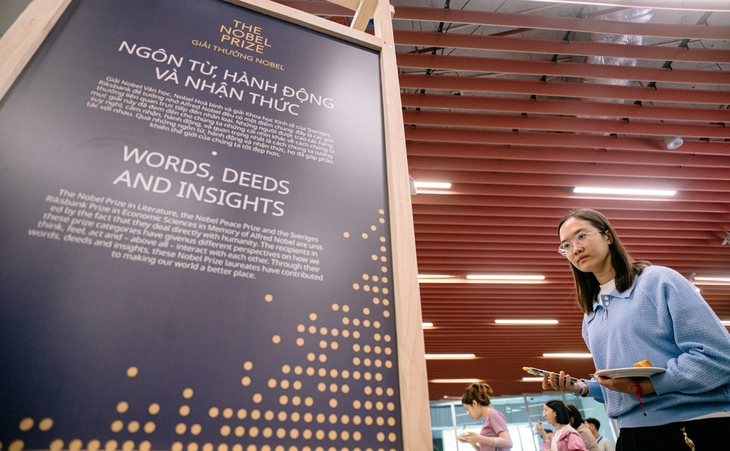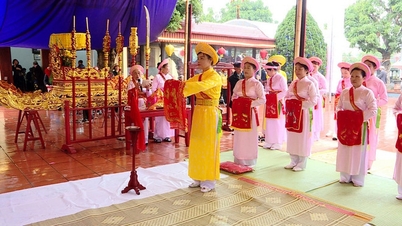
On display at the Nobel Exhibition, part of the Nobel Dialogue 2025 program organized by the Swedish Embassy in collaboration with RMIT University Vietnam in Ho Chi Minh City on September 15 - Photo: THANH HIEP
At the Nobel Dialogue 2025, organized by the Swedish Embassy in collaboration with RMIT University Vietnam in Ho Chi Minh City on September 15th, international technology experts offered various perspectives on balancing artificial intelligence (AI) innovation and responsibility to humanity.
Speaking at the program, Professor Virginia Dignum, a specialist in AI at Umeå University, Sweden, emphasized: "Just as Alfred Nobel was concerned with the impact of science , we – those working in the field of AI – must also ask ourselves: What is the impact of our work? Can AI be used for good, for the benefit of humanity?"
Powerful AI also has strong biases.
Ms. Dignum describes this technology as a double-edged sword: AI solves as many problems as it creates them. While AI offers unprecedented possibilities, it also carries the risk of eroding the very foundations of the civilization that created it.
The very nature of AI's reliance on human data means it can never be truly "neutral" as many believe. Behind seemingly objective AI systems are millions of workers silently collecting, processing, and feeding data. AI doesn't create new data; it merely repeats, and sometimes exaggerates, existing data created by humans.
"Increasingly powerful algorithms not only make AI more accurate and faster, but also amplify existing biases, causing more harm to humans," Professor Dignum warned. Therefore, the biggest challenge for modern society is not controlling AI, but managing it responsibly. She emphasized that responsibility doesn't lie with AI, but with society, the government , and humanity itself.
"We cannot choose between innovation and ethical responsibility. Governance at all levels is the stepping stone to scientific development and welfare," she said.
No one is left behind.
Agreeing with Professor Dignum's argument, Dr. Abdul Rohman, senior lecturer at RMIT University Vietnam, pointed out that the current AI race is still approaching things from a technology-centric perspective, forgetting the idea that AI should revolve around humans.
This leads many AI developers to overlook the importance of thoroughly understanding the specific life experiences of users.
Mr. Rohman cited the example of the deaf community in Ho Chi Minh City, whose vocabulary is very limited due to the limitations of sign language.
However, designing commands for AI is a skill that relies heavily on vocabulary or voice. This inadvertently excludes the deaf community in particular, and vulnerable groups in general, from technological advancements.
"When it comes to inclusive AI governance or innovation that benefits everyone, data for those outside the majority is overlooked. Real-world experiences are not incorporated into AI innovations," Rohman said.
Based on the realities of AI development, Mr. Rohman said that Vietnam still needs to "localize" AI models to better suit the specific domestic context.
Vietnam has not only urban areas like Hanoi, Ho Chi Minh City, or Da Nang, but also mountainous regions where digital infrastructure is underdeveloped. This creates a gap in access to digital technology .
"If we don't address these consequences, already disadvantaged groups will be further pushed backward by AI. The problem is even worse if people know how to use AI but don't know how to protect themselves from the risks. We can research providing a toolkit that allows equitable access to AI while protecting users. That's an area where the private sector, the government, and academia can all work together," he suggested.
A new approach to education in the age of AI.
Amidst the wave of massive investment in AI hardware and infrastructure, many experts assert that the key to leadership lies not in technology, but in people. To dominate AI, start with education.
The SCMP quoted Dr. Jack Ilmonen, an expert in AI and data analytics at Keiser University (USA), as emphasizing: "The country that best equips its citizens to effectively collaborate with AI will rise to the top in productivity, innovation, and competitiveness."
Then, collective strength, amplified by AI, will become a superior strategic advantage. In the overall picture, data and hardware are merely "ammunition," while education is the "weapon."
Dr. Rita Mokbel, President and CEO of Ericsson Vietnam, affirmed that the new situation makes collaboration between the government, academia, and industry even more important. This needs to be implemented starting with the integration of AI into the curriculum.
"In our experience, not only in AI but also in digital transformation, when the government takes the lead and brings together academia, the private sector, and the public sector, miracles can happen."
Source: https://tuoitre.vn/ai-chon-doi-moi-hay-trach-nhiem-20250918075637729.htm













































































































Comment (0)